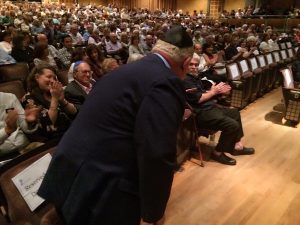MONTREAL — As anyone who goes to college knows, Israeli Apartheid Week (IAW) in Canada, March 9 to 14, was especially marked by screaming, protests and boiled passions this year. And yet, I can't help but feel how totally and utterly useless IAW has become. So to those who organize Israeli Apartheid Week, let’s get some things straight.
You have never intended to solve the conflict. Israeli Apartheid Week is not a week about apartheid, nor about Palestinian rights, but is about one-sided, baseless and stubborn actions meant to cause a commotion. Organizers reduce the conflict to a series of banal, often fallacious facts, and then feed them to their sheepish supporters. Most facts are then used in a disgusting smear campaign meant to delegitimize Israel's right to exist altogether.
But all that talk raises some questions. Israel is resoundingly recognized as a state by the international community. So, why is it that the same people who so vociferously claim Israel is in violation of international law, question Israel's right to exist? Even Norman Finkelstein, one of Israel's most outspoken critics, still advocates for a two-state solution under the authority of international law.
The IAW's position is not only hypocritical, it’s also prejudicial. Why should Palestinians have a right to self-determination, but deny it to Jews? It stands to reason that Israel has a right to exist. Nobody can deny Israel that right – no matter how loud you shout.
You seem to be confused about what academic freedom is. Israeli Apartheid Week supports the boycott, divestment, and sanctions (BDS) campaign, which includes an academic boycott of Israeli academic institutions. This is sheer nonsense. The whole point of an academic institution is to study and to learn from a spectrum of different opinions and views. No matter how you phrase it, BDS strips an institution and its students of academic freedom.
Isn't it interesting how your supporters cry foul when American academic Steven Salaita is denied tenure for tweeting that Zionism transforms “‘anti-Semitism’ from something horrible into something honourable”?
Or, why is it that the same people who shut down speeches by former Israeli prime minister Ehud Olmert (one of the most dovish prime ministers), also praise Columbia University for inviting former Iranian president Mahmoud Ahmadinejad, leader of a regime that severely limits the rights of its citizens? In fact, Israeli institutions are the most committed to open-minded discourse about the conflict. Boycotting them would mean severing academic ties with universities that award PhDs to BDS advocates like Omar Barghouti, and institutions like the Harry S. Truman Institute for the Advancement of Peace, an institute committed to the creation of peaceful solutions to regional conflicts. Tell me, how does this make sense to you?
Even the name, “Israeli Apartheid Week,” is a misnomer. As a liberal Zionist, I must concede that many humanitarian issues exist as a result of the conflict. Settlements are being built in violation of international law; freedom of movement and water access for Palestinians are both limited, and other problematic policies do exist. But this is a far cry from apartheid, both in Israel proper, and even across the Green Line. In Israel, Israeli Arabs enjoy all the same legal rights as any other group. Israeli Arabs serve in Israel’s parliament, cabinet and Supreme Court. Some even elect to join the Israel Defence Forces. Currently the Arab bloc is slated to win more than 10 per cent of the Knesset’s seats.
Beyond the Green Line, things get complicated, but it’s still not apartheid. Palestinians are afforded autonomy in West Bank areas A and B (as defined by the Oslo accords), and enjoy an elected legislature and executive. While this does not mean that Palestinians have every right they deserve, it is important to remember these policies are necessary until Israel's security concerns are met.
So, if this is the case, why do you denounce Israel when other countries are committing genocide? Why is there an Israeli Apartheid Week and not an “End Child Soldiers Week,” “Roma Rights Week,” or “Rohingya Genocide Week”? Your whole reasoning for Israeli Apartheid Week just doesn’t add up.
By far your worst offence is that you are not committed to dialogue. How can we ever expect to resolve any conflict peacefully without dialogue? So, instead of using ineffectual drivel, I propose that the IAW take a new approach.
As my friend so eloquently put it, there shouldn't be an Israeli Apartheid Week, but rather an Israeli-Palestinian dialogue week. This way, we can share our grandparents’ stories of the nakba (“catastrophe,” in Arabic, which the Arabs call the founding of the State of Israel), the Holocaust and the Jewish and Arab spiritual connections to the land. We can argue over human rights issues and Israeli security concerns.
At the end of the week, we might even propose our own strategies to achieve peace. It would be a week of learning and debating, creating friendships and fostering ties. Once we begin to work together peace can be achieved.
The founder of Zionism, Theodor Herzl, once said, “If you will it, it is no dream.” I hope and pray for the day when commitment to peace begins, and we will no longer have to dream. So please, IAW organizers, let’s talk.
Hillel Steinmetz is a student at Dawson College in Montreal, studying pure and applied science.








